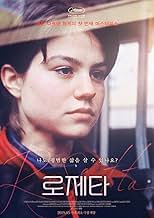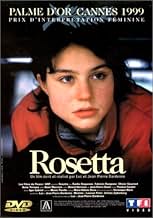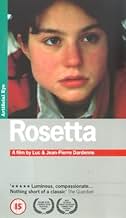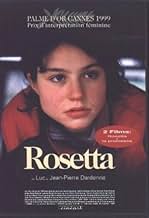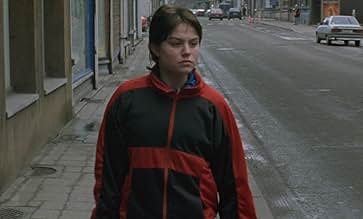Young and impulsive Rosetta lives with her alcoholic mother. Moved by despair, she will do anything to maintain a job.Young and impulsive Rosetta lives with her alcoholic mother. Moved by despair, she will do anything to maintain a job.Young and impulsive Rosetta lives with her alcoholic mother. Moved by despair, she will do anything to maintain a job.
- Directors
- Writers
- Stars
- Awards
- 10 wins & 7 nominations total
Leon Michaux
- First Policeman
- (as Léon Michaux)
- Directors
- Writers
- All cast & crew
- Production, box office & more at IMDbPro
Featured reviews
I saw Rosetta 3 or 4 months ago and it has stayed vividly in my mind. I would like to respond to two other commentaries here which compare Rosetta to earlier films.
One commentary compares it to Nights of Cabiria. But this is no pastoral fantasy like the Fellini. Another contributor calls Rosetta a fake Bresson. Presumably the point of comparison is with Bresson's Mouchette, and it's a good comparison to make, but I don't think it is one that diminishes Rosetta. Both Mouchette and Rosetta capture the flow of time and the characters' interior worlds realistically, but with realisms which are quite different. Mouchette's struggle is a spiritual one; Rosetta's struggle is with her physical conditions.
To make a comparison of my own, albeit an off-the-wall one, Rosetta's determination is strangely like the pure will-power that Lee Marvin demonstrates, barging into the Organisation's HQ in Point Blank. Maybe this forceful quality is what makes it a "war film".
The film-makers do the opposite of sentimentalising Rosetta's conditions as Fellini would have done. Arguably, they even go past Bresson, if you tend to a materialist rather than a religious point of view. They argue how poverty operates, how surviving it involves anger.
There is one moment when Rosetta slips in a lake and we understand exactly at the moment she does, that she may in fact drown. Not a moment that's easy to forget.
One commentary compares it to Nights of Cabiria. But this is no pastoral fantasy like the Fellini. Another contributor calls Rosetta a fake Bresson. Presumably the point of comparison is with Bresson's Mouchette, and it's a good comparison to make, but I don't think it is one that diminishes Rosetta. Both Mouchette and Rosetta capture the flow of time and the characters' interior worlds realistically, but with realisms which are quite different. Mouchette's struggle is a spiritual one; Rosetta's struggle is with her physical conditions.
To make a comparison of my own, albeit an off-the-wall one, Rosetta's determination is strangely like the pure will-power that Lee Marvin demonstrates, barging into the Organisation's HQ in Point Blank. Maybe this forceful quality is what makes it a "war film".
The film-makers do the opposite of sentimentalising Rosetta's conditions as Fellini would have done. Arguably, they even go past Bresson, if you tend to a materialist rather than a religious point of view. They argue how poverty operates, how surviving it involves anger.
There is one moment when Rosetta slips in a lake and we understand exactly at the moment she does, that she may in fact drown. Not a moment that's easy to forget.
This film relies mainly on one camera to capture every little action and detail of the lead character, Rosetta, especially in her reactions to the despair she suffers throughout the film. I caught this one on IFC on May 23rd. The acting is so realistic, it is hard to imagine that the story is fictional and is shot in a documentary type style, where the hand held camera follows the actors, sneaks glimpses of their world in much the same way an ENG crew would on a story about poverty in a small European town where the economy is so bad there is little one can do to survive outside of desperate acts. In this case, Rosetta, the young girl with an alcoholic mother, lives in a trailer with no heat, has to sell re-sewn clothes to make a meager existence until she finally sees an opportunity open up for a job selling waffles at a small stand in a high traffic part of town. A young man who works there is smitten with her and offers to split some earnings from selling waffles he makes outside of his boss's knowledge. To tell you what happens next would give away the rest, but suffice to say this film is bitterly realistic, terribly sad and the ending is rather sudden but it shows some promise for the characters. The movie is shot with almost no budget, but some great camera work, some scenes a little long but edited fairly well, no music, and subtitles under the French dialog. It deserves awards for telling a very credible story demonstrating hardship of the poor in Europe and what measures one has to take to survive. I was deeply moved and driven to weep during painful scenes of the lead character's despair and what seems to be a hopeless situation. The character is genuinely portrayed by a young actress from Belgium performing extremely well for her first film role. Fine work by director and cast.
Most movies try to make you feel good. Even in the most violent or despairing films the writers always provide some sort of relief, usually a character you can identify with. "Rosetta" doesn't not offer this kind of relief. It's not violent in the usual movie fashion, and it's not even as bleak or extreme or hopeless as many social films (after all, it's only the story of a teenage girl who is looking for work), it's just that there is no "this is just a movie after all" escapism. Rosetta is a brute force in motion, obsessive, relentless, and her horizon, made of concrete or muddy Belgian suburbs, is also the movie's horizon (the camera is always focused on her or on what she sees, most of the times in close-up). The war movie comparison is really accurate : "Rosetta" is shot like the first 20 minutes of "Saving Private Ryan" and she spends her time running, attacking, retreating, attacking again, followed by an omnipresent hand-held camera. At the same time, and in spite of (or because of) its reality, her character is also elliptical, hard to pity and you're not likely to love her as you can love Ken Loach's characters, for instance. This is where the movie is a tour-de-force and truly original, but obviously some viewers will have trouble to enter Rosetta's world.
Sometimes you see a work of art and it knocks you out - it's all you can do for days and days to come to get it out of your mind. And you try to find a way in your mind to bring yourself closer to it, immerse yourself in it. You'll read everything about it that you can, try to find some more of the artist's work, find everything you can to do with it. All this to try and replicate the feeling that you experienced when you first encountered the piece. This is the effect that I've been trying to achieve since I saw Rosetta at 1999's London Film Festival.
Though some have attributed Rosetta's success at Cannes to the last-day syndrome; whereby the film that stays freshest in the panel's minds is the one that wins, it smacks of cavilling to suggest that this is the reason behind Rosetta's success - the simple fact is that it's a remarkable film which was only seriously rivalled this year by Almodovar's All About My Mother. Ignorance and snobbery have constantly been at work when Rosetta has been considered by critics, since it's a film which has divided the critics.
Top of the list of things-to-hate about Rosetta is the Dardennes' decision to shoot hand-held, an objection which I can understand but barely comprehend. Rosetta is a film which follows its heroine. Therefore, by mounting the camera almost on her shoulders, we see the world as she sees it, just as we see the world as she thinks it throughout the rest of the film. Most perfect is a scene when she is lying in bed at the house of Ricquet, her (only) friend, when she reassures herself that she's normal, she's found a friend, a *true* job and that she won't fall into the hole. Seldom is a more perfect and more touching marriage and explanation of the inner-self and its outer-conflicts achieved? - it's just magnificent cinema.
Rosetta is a fighter, but although her conflicts are with individuals, in a literal, physical sense, the metaphorical struggle is with the societal brick wall which she comes up against when trying to forge 'une vie normale' for herself. She's fighting against society for the right to live a life; she's fighting against society for a modicum of dignity. In this way, Rosetta is both existentialist and political, though never overtly, much to the credit of the Dardenne Brothers, since Rosetta is a 'universal' film.
The question which Rosetta poses is how we can release ourselves from the trouble we are in. Rosetta believes, and has been taught to believe (ironically, by society) that the way that she can achieve this dignity is by getting a 'true' job - so much so that she phones her boss to tell him that she won't be at work before her suicide attempt. She doesn't see that it's through Ricquet, not through having a job (his job) that she stands the best chance of forging a true identity, a true life and true dignity.
Rosetta is, in effect, just a proletarian hero, fighting society for the right to live and the right to work. However, to see the film in this way is reductionist in the extreme and is self-defeating. Rosetta is, above all, an individual. Her victory is to see that she has a friend who was there all along, and this gives us a remarkable ending that is full of drama; packs a considerable emotional punch and is unforgettable, thanks especially to a stunningly naturalistic performance by Emilie Dequenne, who won an award at Cannes for her portrayal of Rosetta. Her interpretation of the eponymous heroine lends so much to the film that she is as much responsible for the brilliance of the film as the directors are.
This film will never be a hit with middle-class and middle-class, middle-brow critics it in the same way that Schindler's List and The English Patient were; the bourgeoisie never want to get their hands dirty. It's their loss; Rosetta is quite simply one of the most wonderful films you'll ever see.
Though some have attributed Rosetta's success at Cannes to the last-day syndrome; whereby the film that stays freshest in the panel's minds is the one that wins, it smacks of cavilling to suggest that this is the reason behind Rosetta's success - the simple fact is that it's a remarkable film which was only seriously rivalled this year by Almodovar's All About My Mother. Ignorance and snobbery have constantly been at work when Rosetta has been considered by critics, since it's a film which has divided the critics.
Top of the list of things-to-hate about Rosetta is the Dardennes' decision to shoot hand-held, an objection which I can understand but barely comprehend. Rosetta is a film which follows its heroine. Therefore, by mounting the camera almost on her shoulders, we see the world as she sees it, just as we see the world as she thinks it throughout the rest of the film. Most perfect is a scene when she is lying in bed at the house of Ricquet, her (only) friend, when she reassures herself that she's normal, she's found a friend, a *true* job and that she won't fall into the hole. Seldom is a more perfect and more touching marriage and explanation of the inner-self and its outer-conflicts achieved? - it's just magnificent cinema.
Rosetta is a fighter, but although her conflicts are with individuals, in a literal, physical sense, the metaphorical struggle is with the societal brick wall which she comes up against when trying to forge 'une vie normale' for herself. She's fighting against society for the right to live a life; she's fighting against society for a modicum of dignity. In this way, Rosetta is both existentialist and political, though never overtly, much to the credit of the Dardenne Brothers, since Rosetta is a 'universal' film.
The question which Rosetta poses is how we can release ourselves from the trouble we are in. Rosetta believes, and has been taught to believe (ironically, by society) that the way that she can achieve this dignity is by getting a 'true' job - so much so that she phones her boss to tell him that she won't be at work before her suicide attempt. She doesn't see that it's through Ricquet, not through having a job (his job) that she stands the best chance of forging a true identity, a true life and true dignity.
Rosetta is, in effect, just a proletarian hero, fighting society for the right to live and the right to work. However, to see the film in this way is reductionist in the extreme and is self-defeating. Rosetta is, above all, an individual. Her victory is to see that she has a friend who was there all along, and this gives us a remarkable ending that is full of drama; packs a considerable emotional punch and is unforgettable, thanks especially to a stunningly naturalistic performance by Emilie Dequenne, who won an award at Cannes for her portrayal of Rosetta. Her interpretation of the eponymous heroine lends so much to the film that she is as much responsible for the brilliance of the film as the directors are.
This film will never be a hit with middle-class and middle-class, middle-brow critics it in the same way that Schindler's List and The English Patient were; the bourgeoisie never want to get their hands dirty. It's their loss; Rosetta is quite simply one of the most wonderful films you'll ever see.
Have you seen the 1948 Italian classic "Bicycle Thieves"? Yeah think that, pumped up on crack. This is "Italian neorealism" but set in Belgium a half century later.
The character "Rosetta" is a 16-year-old girl who lives in a camper with her nearly catatonic, alcoholic mother and is, as the filmmakers say, "a thin aluminum wall away from living on the streets". The fact that Rosetta is barely an adolescent who is thrust into the role of provider and responsible adult is a clever twist that further turns this social statement upside down. It becomes not just a tale of survival but terrifyingly a coming-of-age flick. Rosetta is socially and emotionally stunted, unfinished and handicapped. It's fascinating to see Rosetta (excellently played by Émilie Dequenne who won Best Actress at Cannes) attempting to grasp concepts of morality and ethics even though she has clearly had no guidance. There is a certain wild animal quality to her which you will immediately feel, and though she is tough and headstrong, she is still just a teenager who doesn't know how to dance, doesn't know what a "friend" is, and whose only reality consists of obsessively trying to find a legitimate job because she feels that's the coveted symbol of having a normal life.
In that respect, this film provides something we can all apply to our lives whether we're 16-year-old homeless kids or rising corporate execs. It's the idea that an obsessive pursuit of some type of social status, or social achievement, or even a relationship, is what we cling to as proof that we have a "normal life".
In a memorable scene our protagonist Rosetta talks herself to sleep by whispering, "Your name is Rosetta. My name is Rosetta. You found a job. I found a job. You've got a friend. I've got a friend. You have a normal life. I have a normal life. You won't fall into the abyss. I won't fall into the abyss. Good night. Good night."
The camera remains very tight, almost claustrophobically so, on Rosetta throughout the entire film which exaggerates the microscopic world she lives in. She repeats routines and engages in trivial labors which are shown to us in almost tedious repetition, but the effect is powerful in conveying a sense of quiet, lonely desperation.
Throughout the history of cinema, there have been many films that document "how the other half lives" but most of them approach the subject as if we are spectators, almost in a patronizing or voyeuristic way that leaves us thinking after the credits roll "phew I'm glad that's not me" but here in "Rosetta" we get a sense that the bizarre life of this 16 year old outcast might very well be the story of the human race.
The character "Rosetta" is a 16-year-old girl who lives in a camper with her nearly catatonic, alcoholic mother and is, as the filmmakers say, "a thin aluminum wall away from living on the streets". The fact that Rosetta is barely an adolescent who is thrust into the role of provider and responsible adult is a clever twist that further turns this social statement upside down. It becomes not just a tale of survival but terrifyingly a coming-of-age flick. Rosetta is socially and emotionally stunted, unfinished and handicapped. It's fascinating to see Rosetta (excellently played by Émilie Dequenne who won Best Actress at Cannes) attempting to grasp concepts of morality and ethics even though she has clearly had no guidance. There is a certain wild animal quality to her which you will immediately feel, and though she is tough and headstrong, she is still just a teenager who doesn't know how to dance, doesn't know what a "friend" is, and whose only reality consists of obsessively trying to find a legitimate job because she feels that's the coveted symbol of having a normal life.
In that respect, this film provides something we can all apply to our lives whether we're 16-year-old homeless kids or rising corporate execs. It's the idea that an obsessive pursuit of some type of social status, or social achievement, or even a relationship, is what we cling to as proof that we have a "normal life".
In a memorable scene our protagonist Rosetta talks herself to sleep by whispering, "Your name is Rosetta. My name is Rosetta. You found a job. I found a job. You've got a friend. I've got a friend. You have a normal life. I have a normal life. You won't fall into the abyss. I won't fall into the abyss. Good night. Good night."
The camera remains very tight, almost claustrophobically so, on Rosetta throughout the entire film which exaggerates the microscopic world she lives in. She repeats routines and engages in trivial labors which are shown to us in almost tedious repetition, but the effect is powerful in conveying a sense of quiet, lonely desperation.
Throughout the history of cinema, there have been many films that document "how the other half lives" but most of them approach the subject as if we are spectators, almost in a patronizing or voyeuristic way that leaves us thinking after the credits roll "phew I'm glad that's not me" but here in "Rosetta" we get a sense that the bizarre life of this 16 year old outcast might very well be the story of the human race.
Did you know
- TriviaContrary to popular belief, the film did not inspire a new so-called "Rosetta Law" in Belgium that prohibited employers from paying teen workers less than the minimum wage and included other youth labour reforms. In a Guardian interview with the Dardenne brothers, Jean-Pierre explained the misconception: "No, that law already existed, it just hadn't been voted through yet. The truth is always less interesting than the fiction."
- GoofsWhen Rosetta is giving her mother money for a water bill she is wearing a jacket with the sleeves fully extended. However in the next immediate cut when she goes outside the sleeves are rolled up.
- SoundtracksSomething New
- How long is Rosetta?Powered by Alexa
Details
- Release date
- Countries of origin
- Official site
- Language
- Also known as
- Розетта
- Filming locations
- Production companies
- See more company credits at IMDbPro
Box office
- Gross US & Canada
- $266,665
- Opening weekend US & Canada
- $20,187
- Nov 7, 1999
- Gross worldwide
- $293,092
Contribute to this page
Suggest an edit or add missing content


![Watch Bande-annonce [OV]](https://m.media-amazon.com/images/M/MV5BOWY4MGMzYTItZjQwOS00MmVhLWE0MDYtMGZmYmFjNTkyYTU2XkEyXkFqcGdeQXRyYW5zY29kZS13b3JrZmxvdw@@._V1_QL75_UX500_CR0)


